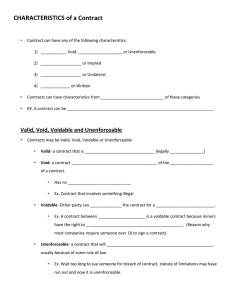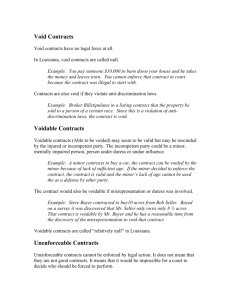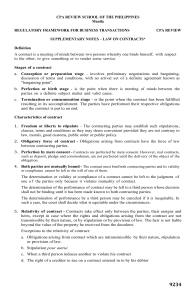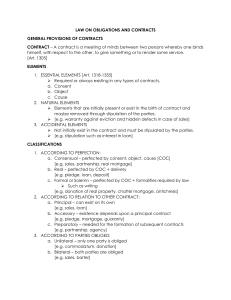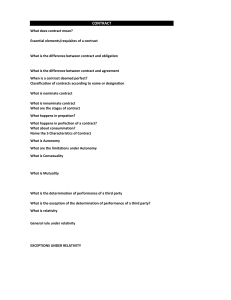Contract Law Outline: Principles, Elements, and Defective Contracts
advertisement
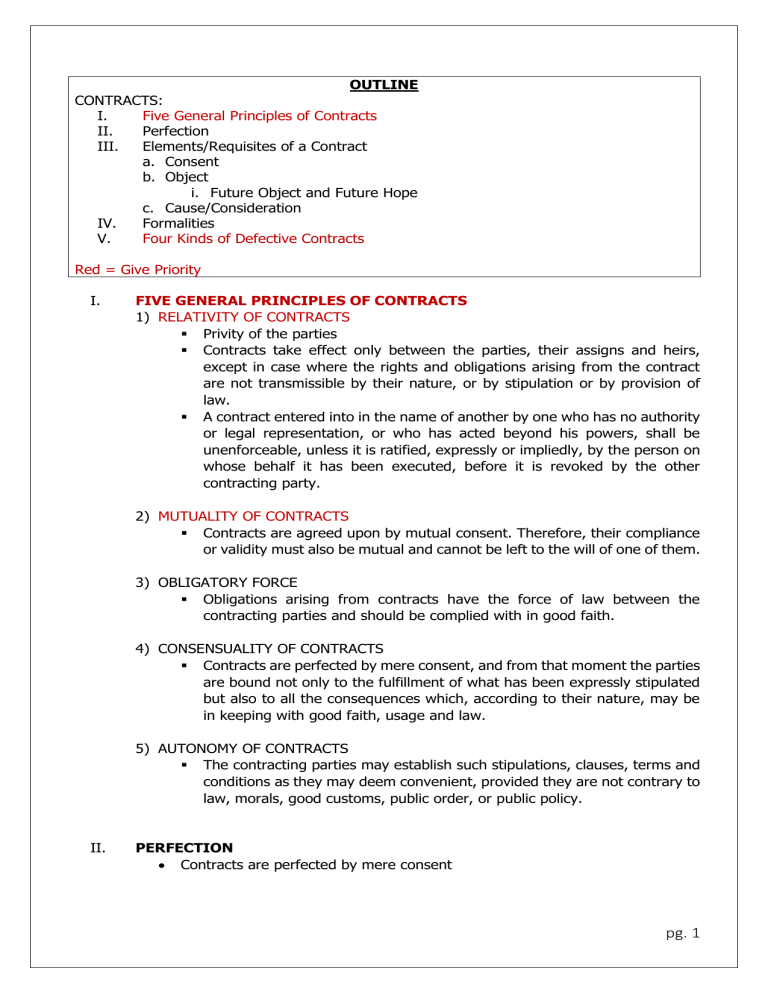
OUTLINE CONTRACTS: I. Five General Principles of Contracts II. Perfection III. Elements/Requisites of a Contract a. Consent b. Object i. Future Object and Future Hope c. Cause/Consideration IV. Formalities V. Four Kinds of Defective Contracts Red = Give Priority I. FIVE GENERAL PRINCIPLES OF CONTRACTS 1) RELATIVITY OF CONTRACTS Privity of the parties Contracts take effect only between the parties, their assigns and heirs, except in case where the rights and obligations arising from the contract are not transmissible by their nature, or by stipulation or by provision of law. A contract entered into in the name of another by one who has no authority or legal representation, or who has acted beyond his powers, shall be unenforceable, unless it is ratified, expressly or impliedly, by the person on whose behalf it has been executed, before it is revoked by the other contracting party. 2) MUTUALITY OF CONTRACTS Contracts are agreed upon by mutual consent. Therefore, their compliance or validity must also be mutual and cannot be left to the will of one of them. 3) OBLIGATORY FORCE Obligations arising from contracts have the force of law between the contracting parties and should be complied with in good faith. 4) CONSENSUALITY OF CONTRACTS Contracts are perfected by mere consent, and from that moment the parties are bound not only to the fulfillment of what has been expressly stipulated but also to all the consequences which, according to their nature, may be in keeping with good faith, usage and law. 5) AUTONOMY OF CONTRACTS The contracting parties may establish such stipulations, clauses, terms and conditions as they may deem convenient, provided they are not contrary to law, morals, good customs, public order, or public policy. II. PERFECTION Contracts are perfected by mere consent pg. 1 III. ELEMENTS/REQUISITES OF A CONTRACT 1) CONSENT Meeting of the Minds - Concurrence of the offer and the acceptance o A contract is perfected by mere consent. From the moment of a meeting of the offer and the acceptance upon the object and the cause that would constitute the contract, consent arises. However, “the offer must be certain” and “the acceptance seasonable and absolute; if qualified, the acceptance would merely constitute a counteroffer. 2) OBJECT (The subject matter) The thing, right or service which is the subject matter of the obligation arising from the contract. Requisites: 1. Within the commerce of man (CIVIL CODE, art. 1347) – either existing or in potency 2. Licit or not contrary to law, morals, good customs, public order or public policy (CIVIL CODE, art. 1347) 3. Possible, legally or physically (CIVIL CODE, art. 1348). 4. Determinate as to its kind or determinable without need to enter into a new contract (CIVIL CODE, art. 1349) 5. Transmissible (CIVIL CODE, art. 1347) – As to Right In order that a thing, right, or service may be the object of a contract, it should be in existence at the moment of the celebration of the contract, or at least, it can exist subsequently or in the future. FUTURE OBJECT AND FUTURE HOPE - A future thing may be the object of a contract. Such contract may be interpreted as: a. Conditional contract, where its efficacy should depend upon the future existence of the thing. b. b. Aleatory contract, where one of the contracting parties assumes the risk that the thing will never come into existence, e.g., insurance. Except [Art. 1347-1349, CC] a. Things which are outside the commerce of men b. Intransmissible rights c. Future inheritance except in cases authorized by law pg. 2 EXCEPTIONS TO THE EXCEPTION a. In case of marriage settlements under Art. 130, CC b. In case of partition of properties inter vivos by the deceased under Art. 1080, NCC 3) CAUSE/CONSIDERATION Definition Refers to the immediate, direct and most proximate reason which justifies the creation of an obligation through the will of the contracting parties and is the essential reason for the contract. IV. FORMALITIES General Rule: o No form necessary for contracts provided that all the essential requisites for their validity are present V. Exception: o When the law requires that a contract be in some form in order that it may be valid [par. 2, Art. 1356, CC] o When the law requires that a contract be proved in a certain way to be enforceable (Statute of Frauds) [par. 2, Art. 1356, CC] o When the law requires a contract to be in some form for convenience, or to be effective against third parties [Arts. 1357 and 1358, CC] FOUR KINDS OF DEFECTIVE CONTRACTS 1) RESCISSIBLE CONTRACTS They are valid because all the essential requisites of a contract exist but by reason of injury or damage to one of the parties or to third persons, such as creditors, the contract may be rescinded. Basis: Lesion – Damage to one of the parties or third party. ART. 1383. The action for rescission is subsidiary; it cannot be instituted except when the party suffering damage has no other legal means to obtain reparation for the same. Kinds of Rescissible Contracts: ART. 1381. The following contracts are rescissible: 1. Those which are entered into by guardians whenever the wards whom they represent suffer lesion by more than one fourth of the value of the things which are the object thereof. o Contracts entered into on behalf of wards. o EXAMPLE: G is the guardian of W (ward). G sells the property of W worth P20,000.00 for only P15,000.00. The contract of sale cannot be rescinded because the lesion4 is not more than one-fourth. However, if the property is sold for less than P15,000.00, W can rescind the sale by proper action in court upon reaching the age of majority. 2. Those agreed upon in representation of absentees, if the latter suffer the lesion by more than one fourth of the value of the things which are the object thereof. o Contracts agreed upon in representation of absentees. pg. 3 3. Those undertaken in fraud of creditors when the latter cannot in any other manner collect the claims due them o Contracts undertaken in fraud of creditors. o The action to rescind in fraud of creditors is known as accion pauliana. Here, as in No. (4), the remedy of rescission may be availed of by a third person. Such contracts are usually made without the knowledge of the creditors. o In order that fraud of creditors may be a valid ground for rescission, the following requisites must also be present: (a) There must be an existing credit prior to the contract to be rescinded, although it is not yet due or demandable later; (b) The subsequent contract made by the debtor conveys a patrimonial benefit to a third person; (c) There must be fraud on the part of the debtor which may be presumed or proved (see Art. 1387.); (d) The creditor has no other legal remedy to satisfy his claim (see Art. 1383.), that is, he cannot recover his credit in any other manner, it not being required that the debtor be insolvent. (See Art. 1177.) 4. Those which refer to things under litigation if they have been entered into by the defendant without the knowledge and approval of the litigants or of competent judicial authority. o Contracts which refer to things under litigation. o EXAMPLE: S sues B for the recovery of a parcel of land. In this case, the land is a “thing under litigation.” If, during the pendency of the case, B sells the land to C without the approval of S or of the court, the sale is rescissible at the instance of S in case he wins in his suit for the recovery of said land unless C is in legal possession of the land in good faith. (Art. 1385, par. 2.) S, however, may protect his right by filing a notice of lis pendens. (Sec. 14, Rule 13, Rules of Court.) If the action involves personal property, S may petition the court for the issuance of an order of attachment (Secs. 1, 2, Rule 57, Ibid.) or the appointment of a receiver (Sec. 1, Rule 59, Ibid.) to place the property in custodia legis 5. All other contracts specially declared by law to be subject to rescission. o Other instances. i. “Art. 1098. A partition, judicial or extrajudicial, may also be rescinded on account of lesion, when any one of the co-heirs’ received things, whose value is less, by at least one-fourth, than the share to which he is entitled, considering the value of the things at the time they were adjudicated.” ii. “Art. 1470. Gross inadequacy of price does not affect a contract of sale, except as it may indicate a defect in pg. 4 iii. iv. v. vi. the consent, or that the parties really intended a donation or some other act or contract.’’ (n) “Art. 1659. If the lessor or the lessee should not comply with the obligations set forth in Articles 1654 [referring to obligations of the lessor] and 1657 [referring to obligations of the lessee], the aggrieved party may ask for the rescission of the contract and indemnification for damages, or only the latter, allowing the contract to remain in force. “Under Article 1539, the vendee may exercise the remedy of rescission, when the lack in the area of the real estate sold be not less than one-tenth of that stated or when the inferior value of the thing sold exceeds one tenth of the price agreed upon. (see also Arts. 1526, 1534, 1539, 1542, 1556, 1560, 1567.) Under Article 1599, where there is a breach of warranty by the seller, the buyer may, at his election, rescind the contract of sale and refuse to receive the goods or if the goods have already been received, return them or offer to return them to the seller and recover the price or any part thereof which has been paid. The refusal of the buyer to pay the remaining balance of the agreed consideration on the alleged ground of vice or defect in the goods sold, while at the same time possessing and enjoying the same, is untenable both on the grounds of law and equity. ART. 1382. Payments made in a state of insolvency for obligations to whose fulfillment the debtor could not be compelled at the time they were affected, are also rescissible. 2) VOIDABLE CONTRACTS They are also valid until annulled unless there has been a ratification. In a voidable contract, the defect is caused by vice of consent. Kind of Voidable Contracts ART. 1390. The following contracts are voidable or annullable, even though there may have been no damage to the contracting parties: (1) Those where one of the parties is incapable of giving consent to a contract; (2) Those where the consent is vitiated by mistake, violence, intimidation, undue influence or fraud. These contracts are binding, unless they are annulled by a proper action in court. They are susceptible to ratification. (n) Prescription: ART. 1391. The action for annulment shall be brought within four years. This period shall begin: In cases of intimidation, violence or undue influence, from the time the defect of the consent ceases. pg. 5 In case of mistake or fraud, from the time of the discovery of the same. And when the action refers to contracts entered into by minors or other incapacitated persons, from the time the guardianship ceases. 3) UNENFORCEABLE CONTRACTS They cannot be sued upon or enforced unless they are ratified. As regards the degree of defectiveness, voidable contracts are further away from absolute nullity than unenforceable contracts. In other words, an unenforceable contract occupies an intermediate ground between a voidable and a void contract. Kinds of Unenforceable Contracts ART. 1403. The following contracts are unenforceable, unless they are ratified: 1. Those entered into the name of another person by one who has been given no authority or legal representation, or who has acted beyond his powers; 2. Those that do not comply with the Statute of Frauds as set forth in this number. In the following cases an agreement hereafter made shall be unenforceable by action, unless the same, or some note or memorandum thereof, be in writing, and subscribed by the party charged, or by his agent; evidence, therefore, of the agreement cannot be received without the writing, or secondary evidence of its contents: a. An agreement that by its terms is not to be performed within a year from the making thereof; parties intended when they made the contract that it should not be performed within a year. EXAMPLE: On December 1, 2003, X entered into an oral contract with Y for the construction of Y’s house to begin on December 10, 2004. The contract must be in writing to be enforceable. b. A special promise to answer for the debt, default, or miscarriage of another; In Cases of Guarantee EXAMPLE: D owes C P1,000.00 with G as guarantor. Here, G has a special promise to answer for the debt of D in case D fails to pay the same. This promise is unenforceable unless it is in writing signed by G. If the promise of G is to pay C what D owes him (C), G’s promise, even if verbally made, is enforceable as it is not a collateral “promise to answer for the debt, default, or miscarriage of another.” c. An agreement made in consideration of marriage, other than a mutual promise to marry; d. An agreement for the sale of goods, chattels, or things in action, at a price not less than Five hundred pesos, unless the buyer accept and receive part of such goods and chattels, or the evidences, or some of them, of such things in action, or pay at the time some part of the purchase money; but when a sale is pg. 6 made by auction and entry is made by the auctioneer in his sales book, at the time of the sale, of the amount and kind of property sold, terms of sale, price, names of the purchasers and person on whose account the sale is made, it is a sufficient memorandum; EXAMPLES: (1) X and Y mutually promised to buy and sell a piano at a price of P4,000.00. This contract must be in writing to be enforceable against either party unless there is delivery or partial or full payment, in which case, it is taken out of the operation of the Statute of Frauds and the contract may be enforced even if it was made orally. (2) If Y denies a contract of sale of goods worth P500.00 but X claims the price is only P450.00 (which is less than P500.00), oral evidence of the sale is admissible inasmuch as the true agreement claimed is not covered by the Statute. e. An agreement for the leasing for a longer period than one year, or for the sale of real property or of an interest therein; EXAMPLE: R agreed to lease his house to E for two (2) years. Again, this agreement must appear in writing to be enforceable unless it is partially executed. f. A representation as to the credit of a third person. 3. Those where both parties are incapable of giving consent to a contract. 4) VOID OR INEXISTENT CONTRACTS. They are absolutely null and void. They have no legal effect at all and cannot be ratified. Kinds of Void or Inexistent Contracts: ART. 1409. The following contracts are inexistent and void from the beginning: 1. Those whose cause, object or purpose is contrary to law, morals, good customs, public order or public policy; 2. Those which are absolutely simulated or fictitious; 3. Those whose cause or object did not exist at the time of the transaction; 4. Those whose object is outside the commerce of men; 5. Those which contemplate an impossible service; 6. Those were the intention of the parties relative to the principal object of the contract cannot be ascertained; 7. Those expressly prohibited or declared void by law. These contracts cannot be ratified. Neither can the right to set up the defense of illegality be waived. RULE ON PARI DELICTO. General Rule: o Parties to a void agreement cannot expect the aid of the law; the courts leave them as they are, because they are deemed in pari delicto, or “in equal fault.’’ pg. 7 o In pari delicto is “a universal doctrine which holds that no action arises, in equity or at law, from an illegal contract; no suit can be maintained for its specific performance, or to recover the property agreed to be sold or delivered, or money agreed to be paid, or damages for its violation; and where the parties are in pari delicto, no affirmative relief of any kind will be given to one against the other.’’ Exception: o Violation of the Labor Code as to Working hours o Violation of the Labor Code as to Minimum Wage o Violation of the Price Control Law o Sale under of property under Free Patent Reason: Public Policy FINAL EXAM QUESTIONS LAST YEAR: 1. What are the five (5) Principles of Contracts? Define Each 2. In a Contract of Lease, it was specifically provided that the “Contract may be renewed at the option of the Lessee by giving notice to the Lessor.” Is the stipulation valid? 3. In a Contract of Sale, the consideration stated was Php. 1.00 although the actual consideration was Php. 100, 000.00. The Contract of Sale was assailed by the Heirs of the Vendor, claiming that the Sale was VOID on the ground of Bad Faith and Inadequacy of Consideration. Is the Sale Void? Explain. 4. X requested his friend Y to be a Guarantor in a loan he is obtaining form Z. Y consented and even called by Phone Z that he is assuming the obligation of a guarantor. For Failure to pay, Z sued X and Y for the recovery of the loan. Y raised the defense that the contract is UNENFORCEABLE against him. Is Y Liable as a Guarantor? 5. A, acting as guardian of minor B, sold the minor’s property worth Php. 100,000.00 for the sum of Php. 80, 000.00. Is the Contract of Sale Rescissible? Explain. 6. D was the owner of a property covered by a Free Patent Title. Within the FIVE-YEAR PERIOD, D sold the property to M. Thereafter, D filed an action to recover the property on the ground that the Sale was VOID because the sale was made during the FIVE-YEAR PROHIBITION period. M invoked as his defense PARI DELICTO, Claiming that both of them are at fault in violating the law, hence, the law leaves them where they are and no one can maintain an action against each other. Is the defense tenable? Explain. pg. 8
